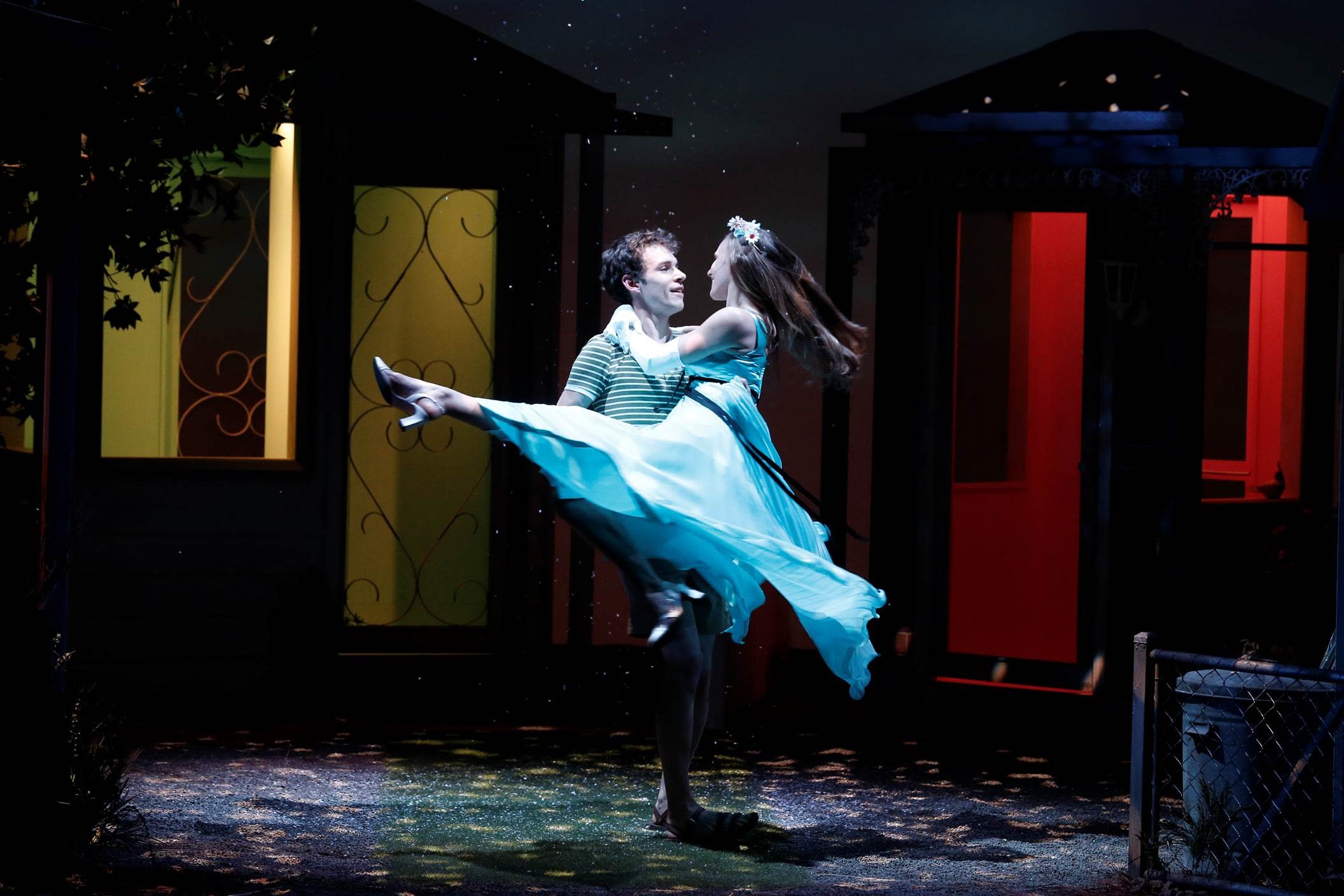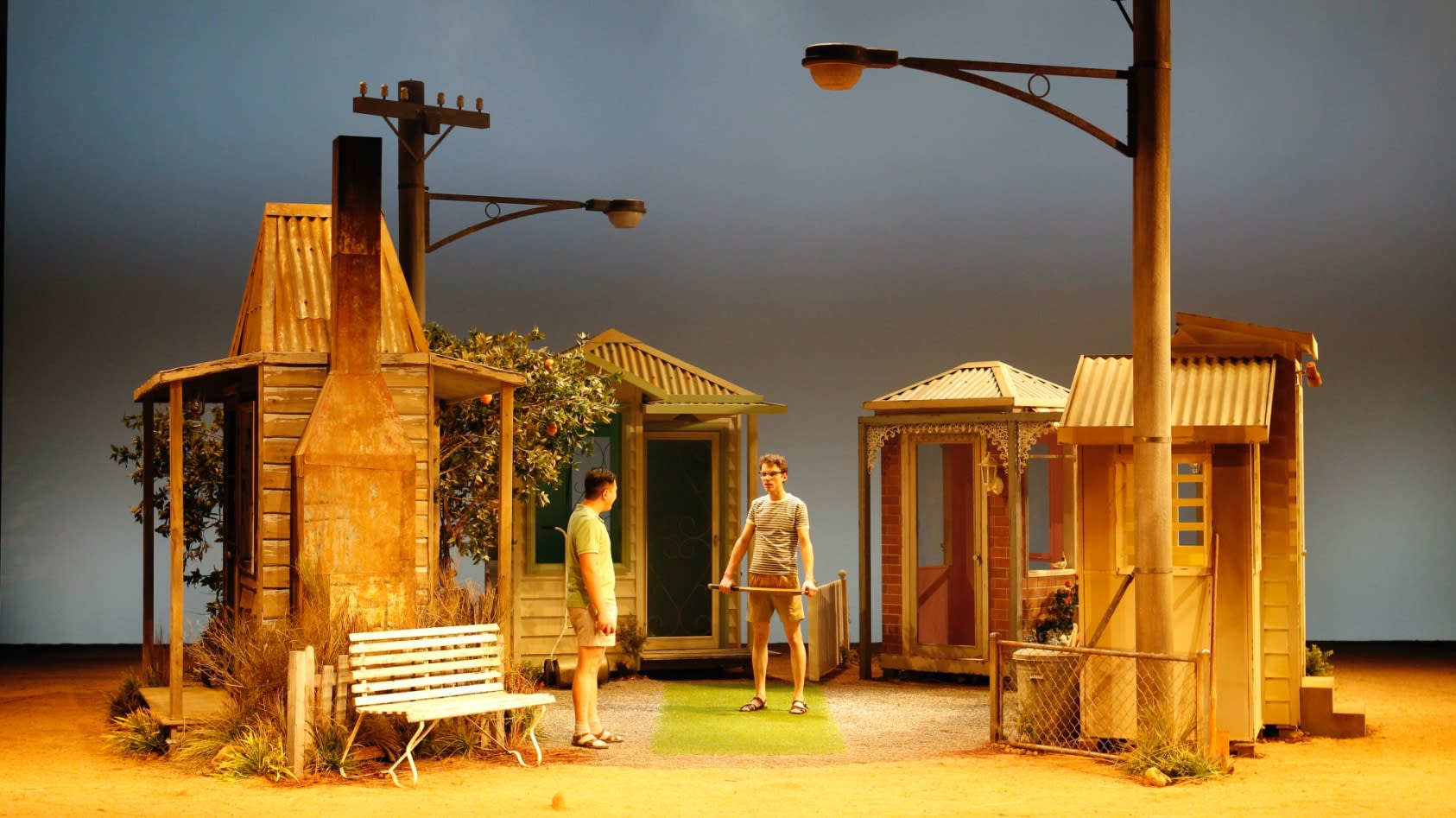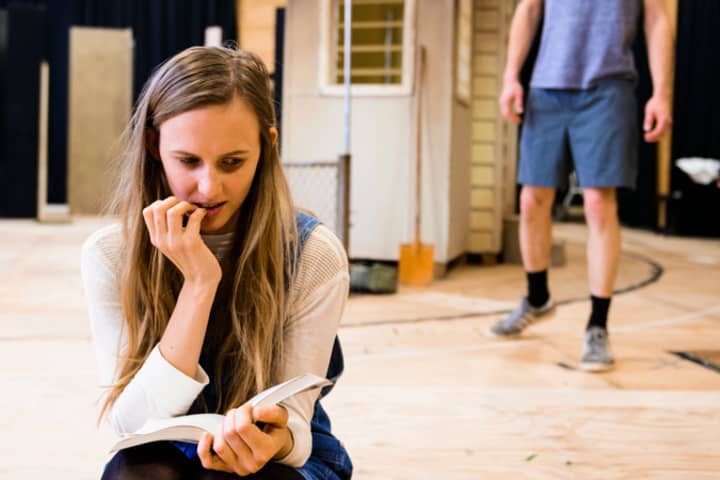We speak to some of the Jasper Jones cast about the script, their characters, and the MTC production.
In a nutshell can you describe the character you play and what sort of person they are?
Guy: Jasper is a 15 to 16-year-old boy, uncertain of his exact age. He is an Indigenous boy who is called a half-caste by the townspeople of Corrigan because his mother is Aboriginal and his father is white. He tends to be known as the town’s scapegoat, and trouble-maker. He’s pretty cool! He’s quite athletic, street smart, and worldly. He’s seen a lot and is very aware of the world around him. He knows that his mother died in a car accident when he was a baby, but not the circumstances.
Taylor: I play Laura Wishart and Eliza Wishart. I think Laura is very cool, cooler than Eliza. Eliza is about 13. She loves reading, and is falling in love for the first time. She comes across as quiet and seems a little troubled, but as you get to know her she is actually the opposite. She is quite sensual and has a certain confidence, but she needs to feel a strong sense of trust before she reveals herself. There is no trust in her family. As a result of that she has had to bottle up the truth, has not been able to explain to anyone but has had to deal with things alone. So the difficulties that exist within her family, specifically with regard to her father and Laura, have led to a deep secrecy. This has been made more difficult as she is one of the daughters of Corrigan’s Mayor. She knows her life is all a lie and she is waiting to explode.
Nicholas: I play Charlie Bucktin who is a 13-year-old bookish kid from Corrigan. There are a few things I find interesting about Charlie. He is a very smart young man, very much so even for a 13-year-old, but it is mainly in relation to the books he has read – Harper Lee, Jack Kerouac, and Truman Capote. It isn’t until he meets Jasper Jones that he begins to experience some of the things he reads first hand – racism, death, sexuality. Charlie has a lot of emotions he wants to share but never has the right way to express them, especially with Eliza who he is smitten with. He has ideas about how things are meant to be, mainly from what he has read in books, but when he tries to take them on in real life, it’s a bit of a mess. He has a very loving father for whom he has a great deal of respect and idolises in a way and is someone who Charlie might like to be. Wesley is a teacher at the high school in Corrigan, is quite liberal-minded and a bit different from others in Corrigan, and he has a great deal of love for his father. Not so sure about his mother, Ruth, who is more interested in leaving Corrigan than staying and they clash a lot.
Harry: Jeffrey Lu is the classic first generation Asian Australian. He struggles a lot with the tension between Australian larrikin-ness and Asian-ness in terms of his family’s culture. In the 1960s and, I think even more so now with Asian-Australians, they tend to take on bogan-type behaviour so they can fit in. I also think every character in this play/story is an enigma. Jeffrey for instance has a seeming false bravado, but he actually has a strong sense of self that we see throughout the play and the novel. He is quite optimistic considering the treatment he gets from the town.
Do you think he feels hurt by that?
Harry: Yes, I think he does, but like a lot of ethnic minorities or marginalised groups he learns to adapt. Cricket is his weapon and his way of fitting in with the local boys and also beating them. He wants to be someone of significance.
 Nicholas Denton and Taylor Ferguson. PHOTO: Jeff Busby
Nicholas Denton and Taylor Ferguson. PHOTO: Jeff Busby
Possibly all four of the characters each of you play is different in ways that compel them to come together. Would you agree?
Nicholas: Yes. It is really interesting how concepts of difference are explored in the story.
Is this a challenging story to tell? For instance, the issues and experiences the characters have?
Taylor: As an actor it is a whodunit, a mystery. We had a big discussion about the ‘temperature’ of the scenes, especially for Eliza with regard to giving away her part in Laura’s death, what she knows, and what she wants to give away. This is a key subtext and it is challenging.
Guy: As an actor the challenging thing for me is Jasper’s arc as a character; his emotional and mental journey of finding the girl he loves, who is also his best friend, his mother, his sister, his world, his family – finding Laura dead. That highly emotional journey, one that is established at the beginning and then has to be taken through to the end of the play, has a cost. Some of the choices made are emotionally expensive, and having to maintain those choices night after night is really challenging. It is tricky trying to deal with that arc and learning how to get to 100% sometimes quite quickly because I am not on stage all the time like Nick. In some scenes I have to drop straight into the moment, move out of it and then carry it over to the next scene, while backstage putting on make-up or changing and then jump back in. I find that is one of the most challenging aspects and, at the end, I have to shake it off and turn back into Guy.
Harry: Two things come to mind. As an actor I am not 12-13 years of age so finding the temperature of playing that age without seeming false yet still finding Jeffrey. I think Craig Silvey, the writer, and Kate Mulvany, the playwright, have used Jeffrey to represent some of the little musings and small nothings in the story, like the discussion about Superman and Batman. Jeffrey can be seen as the comic relief, the lightness in the play. As Guy said it is difficult to maintain the arc and to not play Jeffrey on the one note. I think Kate’s script with Craig’s support has given Jeffrey more of an emotional range within the narrative. Jeffrey tells Charlie that his family has been bombed in Vietnam and even though that’s in the past, it is quite relevant to now and it is almost poetic in its currency.
Nicholas: One thing that stands out for me as an actor and a character (Charlie) is the emotional disconnect within the town and its occupants, and between the characters. We all want to say something to each other but don’t necessarily have the right words to do it. So Charlie can’t say the right things to Eliza, to Jasper and even to Jeffrey. I imagine that was prevalent in 1965 when people didn’t talk about emotions as we tend to do now. There is a scene with Wesley, Charlie’s father, where they just don’t say what they want to. That disconnect is challenging to play as an actor.
Let’s talk now about the set design. Sam talks about it as being a character within the play. How does the set enable you to feel part of Corrigan, and how does it create the world of the play?
Nicholas: Sam has populated the town with a range of different characters so that it is a working, moving town and the audience has been invited in. The set revolves and houses that are distinct to the characters come alive when the characters are engaging with the set. It gives a sense of longevity. So the set provides an insight into Corrigan in a very visceral way. My house is the yellow weatherboard.
Harry: The red brick one is Jeffrey’s with its flower-bed and awning.
Taylor: It is so much fun! There is a dam that Laura is put into by Charlie and Jasper and because of the stage revolve we get to travel and to walk around the town. It feels like we are travelling in time and distance.
Harry: I think it is taking things to the next level. Often we are working two-dimensionally and that is usually what the playing space will be. So to have a three dimensional world means it becomes more vibrant and lively. And we get to swing on the houses and there is a scene where Jeffrey and Charlie are on the roof and this elevates the scene because they talk about existentialism and what life is about and they are literally closer to the universe. I think the audience will find that enriching.
Guy: For me the set is fun. In the Belvoir production we had only two set pieces for the houses, and our Corrigan was the audience whom we endowed and got amongst. Now we have a full world that we can have a relationship with, with fences and gardens, and it is great to have these there as obstacles. So the audience gets to see how dangerous it is and how far we travel, which is the great thing about the Sumner.
 Harry Tseng and Nicholas Denton. PHOTO: Jeff Busby
Harry Tseng and Nicholas Denton. PHOTO: Jeff Busby
Something that Theatre Studies students need to consider is the notion of status and motivation. So how might you talk about that?
Harry: I was watching Alain de Botton, the philosopher, on ABC last night and he was saying that in any relationship both parties are teacher and apprentice and neither must deny each other that status. For me, the relationship between Jeffrey and Charlie is true to that and the apprentice and master roles constantly shift. Even within the novel there aren’t any interactions between Jasper Jones and Jeffrey Lu. However there is sassy time and his new relationship with Charlie when Eliza enters the scene. Asian characters also tend to be placed in the background. Asians are often treated badly but not badly enough. Historically many Asian cultures don’t protest on a major level. In that context their roles in theatre are reliant on writing. What Craig Silvey has done and what Kate Mulvany has done is to foreground Jeffrey Lu.
Taylor, how do you consider the status of Eliza in this story?
Taylor: Eliza is a character in the play who has something to hide, and this means she tends to play low status. It hits her on occasion, the enormity of it all, switched on by her visual memory of Laura dying, but she rarely plays high status, perhaps at the end with Jasper and Charlie. Eliza also has Laura’s letter, something she must hide, and this generates the powerful sub-text we were talking about before. However, the letter is also something of power if she chooses to use it. I think Eliza’s status is difficult to determine and it is ambiguous because of her need to remain silent. Her status is made more complex by the possession of her sister’s letter, and falling in love with Charlie. Maybe her behaviours and actions are more about coping than anything else. Her need to be fathered hasn’t been met. To be fathered you are taught to be in the world and to be mothered is to be nurtured and your feelings considered but her family circumstances haven’t allowed that. Perhaps the act of burning down the family house is her high status moment.
He is quite a heroic character, and I think your status is vested in the audience, we decide for you.
Guy: It is a cool thing for the audience to need to grapple with that. I think it is important that an audience gets to decide my status, especially an Australian audience!
What is the hopefulness, affirmation and positivity in Jasper Jones?
Nicholas: I think it is the concepts of courage and bravery, for all the characters who are all outsiders in their own way. How do they show courage in the face of death, discrimination, racism, and violence? Charlie, Jasper, Eliza and Jeffrey are fortunate in being able to make connections that enable that.
Harry: Following your heart and being true, that typical coming of age journey. I also think the characters have love for each other, different forms of love for each other and that supports them and gives them courage. Jasper Jones also depicts a side of Australia and its history that we are often not shown.
Guy: It is a good question. I think for Jasper there is a sense of possibility when he leaves Corrigan that he can go anywhere but it is, as the others have said, about being courageous, speaking out and kicking back. There is a fork in the road; he could go either way.
Taylor: The notion of hope is quite small and it is about everyday living. Eliza has been able to connect closely to someone else about coming to terms with the death of her sister, Laura. So for her, the positivity and hope is to find a way to let that lie and to become the person she wants to be.
Harry: You put it well. It is the small things and that is the power of the play. They have all stepped up in some way, sometimes in very small ways, and that is life. The audience sees themselves in these characters to varying degrees and so they also see the glimpses of hope.
Nicholas: There is that line in the play, “The more you have to lose, the braver you are for standing up”. So the play acknowledges that and the need to sometimes take risks.
This is an excerpt from the extended interview conducted by Meg Upton as part of the Jasper Jones Teachers' Notes.
Published on 1 August 2016





